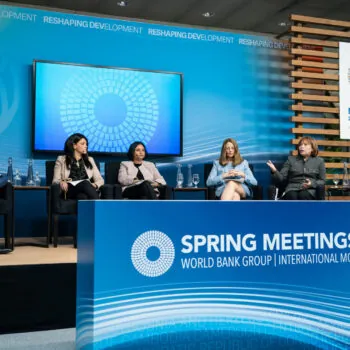10-16 April 2023. The 2023 Spring Meetings of the World Bank Group and the International Monetary Fund (IMF) and related ancillary events comprised of the joint World Bank-IMF Development Committee and the IMF’s International Monetary and Financial Committee events. Ancillary meetings were scheduled throughout the week.
High-level conversations with development experts, global leaders, and policymakers focused on adapting to climate change, improving health outcomes, reducing debt burdens, and many, many more key development issues.
Few sessions focused on food systems despite rising pressure to increase support for low-income countries to address the ongoing food, climate and debt crises.
15/04 The State of the Africa Region: Harnessing Natural Resources for a Sustainable Future
Global efforts to decarbonize economies are likely to create demand for 3 million tons of minerals and metals – many of which are found in Africa. Thus, the continent has an opportunity to harness natural resource wealth to accelerate energy access and a green transition, drive economic transformation and jobs, and generate more fiscal revenues. Speakers focused on this opportunity and the related challenges facing policy makers.14/04 Investing in Human Capital to Accelerate the Green Transition
At the 2023 World Bank-IMF Spring Meetings, representatives from government, academia, and the private sector stressed the importance of thinking creatively, working together, and providing more resources to improve human capital—the knowledge, skills, and health that people accumulate over their lives that enable them to achieve their potential.Related previous World Bank webinars
6/04/2023 Altered Destinies: Middle East and North Africa Economic Update
High inflation and rising food prices pose a challenge to economies across the Middle East and North Africa (MENA), where growth is expected to slow in the coming year. Watch a replay of this World Bank Live event which marked the official launch of the latest Middle East and North Africa Economic Update.
During the replay, you will hear firsthand from the World Bank’s Chief Economist in MENA, Roberta Gatti, about the region’s economic prospects and the impact of rising food prices, which impact the poor most. Gatti explains in her presentation how even temporary increases in the price of food can have lasting impacts across generations in terms of education, health and future income prospects.After the presentation, a high-level panel discussed the impact of inflation and food insecurity from their perspectives. You will discover what the World Bank is doing to address food insecurity and how the Islamic Development Bank Group is responding to food price shocks. The Middle East Institute’s assessment of how people on the ground are coping with inflation, drawn from recent opinion surveys, offers additional context on the dramatic impact of food insecurity which could reverberate for years to come.
This event discussed key initiatives and operations, in a synthesized way, for delivering climate mitigation action to sub-sectors such as livestock and rice and will showcase relevant Bank projects, while engaging the voices of client countries around key mitigation themes.
00:00 Welcome! COP27 | Delivering Climate Action While We Feed the World
00:39 Visions from Somalia
05:07 Introductory remarks
13:11 Food systems, climate action, GHG emissions, food security
29:10 Scaling up climate smart agriculture in Bangladesh
34:16 Initiatives and programs from the US government
37:12 Food systems and climate financing
39:23 Getting involved the private sector
00:39 Visions from Somalia
05:07 Introductory remarks
13:11 Food systems, climate action, GHG emissions, food security
29:10 Scaling up climate smart agriculture in Bangladesh
34:16 Initiatives and programs from the US government
37:12 Food systems and climate financing
39:23 Getting involved the private sector
- Muhammad Abdur Razzaque, Minister of Agriculture, Bangladesh
- Moisés Santiago Bertoni, Minister of Agriculture and Livestock, Paraguay
- Mustapha Baba Shehuri, Minister of State for Agriculture and Rural Development, Nigeria -
- Maria Helena Semedo, Deputy Director General, FAO
- Emma van de Ven, Strategy & Research Lead, Acorn, Rabobank
- Julian Lampietti, Manager for Global Engagement, Agriculture and Food, World Bank
- Benoît Bosquet, Regional Director, Sustainable Development, East Asia and Pacific, The World Bank
- Rick Duke, U.S. Deputy Special Envoy for Climate



No comments:
Post a Comment